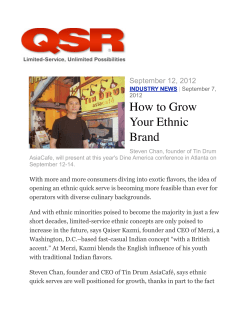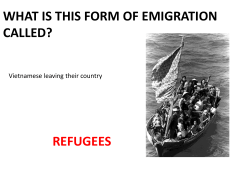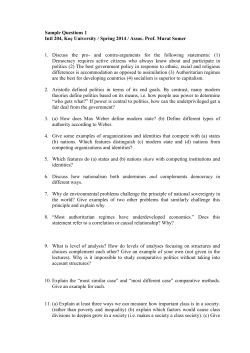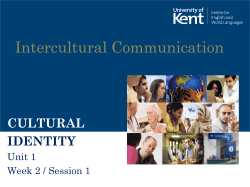
Merlin Schaeffer – Curriculum Vitae
Merlin Schaeffer Curriculum Vitae Education 2012 Doctor of Social and Behavioural Sciences, Universiteit van Amsterdam. Amsterdam Institute for Social Science Research (AISSR), With Distinction 2008 Master of Arts, Social Sciences, Humboldt Universität zu Berlin. Institute of Social Sciences, Final Grade 1.0 2006 Bachelor of Arts, Social Sciences, Humboldt Universität zu Berlin. Institute of Social Sciences, Final Grade 1.1 Academic Positions Winter Visiting Professor (Vertretungsprofessor, W3), Karlsruhe Institute of 2014/15 Technology (KIT). Department of Sociology, Media and Cultural Studies Since 2012 Senior Research Fellow, WZB — Berlin Social Science Center. Department “Migration, Integration, Transnationalization” 2009–2012 Research Fellow, WZB — Berlin Social Science Center. Department “Migration, Integration, Transnationalization” 2006–2007 Student Researcher, Humboldt Universität zu Berlin. Georg-Simmel-Center for Metropolitan Studies 2003–2004 Student Researcher, Charité Universitätsmedizin Berlin. Department for Medical Sociology Associations & International Experiences Since 2014 External Fellow, MZES — Mannheimer Zentrum für Europäische Sozialforschung. Department A “European Societies and their Integration” 2010 Visiting Scholar, Harvard University, Cambridge, MA, USA. Kennedy School of Government 2010-2012 Doctoral Student, Universiteit van Amsterdam. Amsterdam Institute for Social Science Research (AISSR) 2007-2008 Visiting Student, The Graduate Center, City University of New Yorck, USA. Department of Sociology 2005-2006 Visiting Student, University of Sussex, Brighton, UK. School of Social and Cultural Studies Mariannenstr. 20 – 10999 D-Berlin T +49(0)1577/3891183 • B merlin.schaeffer@posteo.de Other [CO:STA] In 2010, Martin Ehlert, Christian Rauh and myself found, and since then regularly organize, the “Colloquium for Statistical Analyses at the WZB”. So far we have organized 31 talks and workshops on topics such as matching techniques, computer-automated content analysis, or most recently (un)conditional quantile regression. Since 2014, the colloquium is supported with regular funds by the WZB. → [Homepage]. Conference “Ethnic Diversity and Social Capital: Mechanisms, Conditions and CausalOrganizations ity”, WZB — Berlin Social Science Center, May 23rd-25th 2013, with Ruud Koopmans and Bram Lancee “Hierarchical Data, What to Do? Comparing Multi-Level Modelling, ClusterRobust Standard Errors, and Two-Step Approaches”, 5th Conference of the European Survey Research Association (ESRA), University of Ljubljana, July 18th 2013, with Johannes Giesecke and Jan Paul Heisig Professional Engagement Postdoc For the academic years 2012 to 2014, I am one of four post-doc representatives Representative at the WZB — Berlin Social Science Center. Associations Deutsche Gesellschaft für Soziologie (DGS), European Survey Research Association (ESRA), RC28 Research Committee on Social Stratification Reviews Journals American Journal of Sociology (2x), British Journal of Political Science, European Political Science Review, European Sociological Review, Geoinformatics & Geostatistics, Journal of Conflict Resolution, Journal of Ethnic and Migration Studies (2x), Journal of Happiness Studies, Nationalism and Ethnic Politics, Research in Social Stratification and Mobility, Social Forces, Social Indiators Research (2x), Social Networks, Social Science Research, Soziale Welt, Swiss Political Science Review, Zeitschrift für Soziologie Publishing Routledge, Ashgate (2x) Houses Other Estonian Research Council (ETAg) Data Collection EDCAS “The Ethnic Diversity and Collective Action Survey”: Three country CATI survey with two oversamples of persons of immigrant origin (n = 10,200). → [Technical Report] Mariannenstr. 20 – 10999 D-Berlin T +49(0)1577/3891183 • B merlin.schaeffer@posteo.de Courses Taught Winter Introduction to Sociology (Lecture), Karlsruhe Institute of Technology, 2014/15 Bachelor (Evaluated 1.69/5). Introduction to Sociology (Tutorial), Karlsruhe Institute of Technology, Bachelor (Evaluated 1.78/5). Immigration, Integration & Acceptance (Seminar), Karlsruhe Institute of Technology, Master (Evaluated 1.78/5). Research Methods Colloquium, Karlsruhe Institute of Technology, Bachelor, Master & PhD. Spring 2015, Quantitative Migration and Integration Research (Compact Course, ‘14, ‘13 & ‘12 12 hours), Universidad de Deusto, Bilbao, Master in International Migration and Social Cohesion (MUNDUS MISOCO) (Evaluated 1.5/5 (’12); 1.68/5 (’14)). Winter 2015, Introduction to Statistics (Compact Course, 40 hours), TU‘14, ‘13 & ‘12 Darmstadt, Master in International Cooperation and Urban Development (MUNDUS URBANO) (Evaluated 1.47/5 (’12); 1.76/5 (’13); 1.16/5 (’14)). Winter Migration Policy and Immigrant Integration in International Com2012/13 parison (Seminar), Humboldt Universität zu Berlin, with Ines Michalowski, Master (Evaluated 1.83/6). Summer 2012 Immigration and Integration in Comparative Perspective (Seminar), Humboldt Universität zu Berlin, with Sarah Carol, Bachelor (Evaluated 1.67/6). 2011 Introduction to Multi-Level Modelling (Workshop, 2 hours), Free University Berlin, Institute of Sociology, Master. Winter Introduction to Social Theory (Tutorial), Humboldt Universität zu 2009/10 Berlin, Bachelor (Evaluated 1.14/6). Mariannenstr. 20 – 10999 D-Berlin T +49(0)1577/3891183 • B merlin.schaeffer@posteo.de Publications Peer-Reviewed Koopmans, R. & Schaeffer, M., (2015), Statistical and Perceived Diversity Journal and Their Impacts on Neighborhood Social Cohesion in Germany, France and Articles the Netherlands, Social Indicators Research. Doi:10.1007/s11205-015-0863-3. Schaeffer, M., (2014), The Social Meaning of Inherited Assets. Moral Ambivalences of Intergenerational Transfers, Forum Qualitative Sozialforschung/Forum Qualitative Research 15(1): Art. 13 → [Open Access]. Reprint: (2014) Historical Social Research 39(3/4) Schaeffer, M., (2013), Can Competing Diversity Indices Inform us About Why Ethnic Diversity Erodes Social Cohesion? A Test of Five Diversity Indices in Germany, Social Science Research 42(3): 755–774. Schaeffer, M., (2013), Inter-Ethnic Neighbourhood Acquaintanceships Between Migrants and Natives in Germany. On the Brokering Roles of InterEthnic Partners and Children, Journal of Ethnic and Migration Studies 39(8): 1219-1240. Schaeffer, M., (2013), Which Groups are Mostly Responsible for Problems in Your Neighbourhood? The Use of Ethnic Categories in Germany, Ethnic and Racial Studies 36(1): 156-178. Monographs Schaeffer, M., (2014), Ethnic Diversity and Social Cohesion: Immigration, Ethnic Fractionalization and Potentials for Civic Action, Aldershot: Ashgate. Reviews of the Book: “I will be including it in the reading list for substantive courses both on diversity and neighbourhood effects and research methods discussing measurement techniques, model building, the use of open-ended questions, and the graphical presentation of results” Neli Demireva (University of Essex), European Sociological Review. “This is both a thorough and very thoughtful book, with much to recommend it to scholars interested in the impacts of ethnic diversity on social cohesion and trust from a range of disciplines, and it deserves the very positive cover endorsements from Robert Putnam, Miles Hewstone and Michael Banton” Paul Thomas (University of Huddersfield), Ethnic and Racial Studies. “Overall, Ethnic Diversity and Social Cohesion should be an essential read for social scientists studying social change in European societies brought about by international mobility and ethnic diversification” Aneta Piekut (University of Sheffield), Central and Eastern European Migration Review. Edited Koopmans, R., Lancee, B. & Schaeffer, M., (2015), Immigration and Volumes Social Cohesion in Europe and North America: Mechanisms, Conditions and Causality, London: Routledge. Book Chapters Lancee, B. & Schaeffer, M., (2015), “Moving to Diversity: Residential Mobility, Changes in Ethnic Diversity and Concerns about Immigration” in R. Koopmans, B. Lancee & M. Schaeffer: Immigration and Social Cohesion in Europe and North America: Mechanisms, Conditions and Causality, London: Routledge. Mariannenstr. 20 – 10999 D-Berlin T +49(0)1577/3891183 • B merlin.schaeffer@posteo.de Koopmans, R., Lancee, B. & Schaeffer, M., (2015), “Ethnic Diversity in Diverse Societies: An Introduction” in R. Koopmans, B. Lancee & M. Schaeffer: Immigration and Social Cohesion in Europe and North America: Mechanisms, Conditions and Causality, London: Routledge. Discussion Koopmans, R., & Schaeffer, M., (2014), Perceptions of Ethno-Cultural Paper Diversity and Neighborhood Cohesion in three European Countries, WZB Discussion Paper SP VI 2014-103 → [Open Access]. Koopmans, R., & Schaeffer, M., (2013), De-Composing Diversity: InGroup Size and Out-Group Entropy and Their Relationship to Neighbourhood Cohesion, WZB Discussion Paper SP VI 2013-104 → [Open Access]. Schaeffer, M., (2013), Ethnic Diversity, Public Goods Provision and Social Cohesion. Lessons from an Inconclusive Literature, WZB Discussion Paper SP IV 2013-103 → [Open Access]. Koopmans, R., Dunkel, A., Schaeffer, M. & Veit, S., (2011), Ethnische Diversität, soziales Vertrauen und Zivilengagement. Projektbericht im Auftrag des Bundesministeriums für Familie, Senioren, Frauen und Jugend, WZB Discussion Paper SP IV 2011-703 → [Open Access]. Schaeffer, M., Koopmans, R., Veit, S., Wagner, M. & Wiedner, J., (2011), The Ethnic Diversity and Collective Action Survey (EDCAS). Technical Report., WZB Discussion Paper SP IV 2011-701 → [Open Access]. Reviews Schaeffer, M., (2011), Ethnic Diversity and Social Cohesion in the Netherlands, www.Migrationeducation.org → [Open Access]. Public Media Schaeffer, M., (2013), WZB-Studie: Kinder als Katalysatoren der Vielfalt. [MIGAZIN] Schaeffer, M., (2012), WZB-Studie: Welcher Nachbar stört am meisten?. Radio: [RBB Kulturradio] [SWR2 Wissenschaft aktuell] [Multicult.fm] Newspapers: [Der Tagesspiegel] [Welt Kompakt] [Der Standard] [The Local] [Sabah] Koopmans, R & Schaeffer, M., (2012), WZB-Studie: Geschwächter Zusammenhalt. Was Nachbarschaft in ethnisch heterogenen Regionen prägt. [WZB-Mitteilungen Nr. 135] Mariannenstr. 20 – 10999 D-Berlin T +49(0)1577/3891183 • B merlin.schaeffer@posteo.de Presentations Invited Talks 2015 Positive Statistical Discrimination of Immigrant Minorities? Why School Drop-Outs of Turkish Origin Earn More in Germany, “Mundus Urbano Public Lecture”, TU-Darmstadt, Germany: May 20th Contested Boundaries: Explaining Where Ethno-Racial Diversity Provokes Neighborhood Conflict, MZES-Colloquium, University of Mannheim: February 17th 2014 Contested Boundaries: Explaining Where Ethno-Racial Diversity Provokes Neighborhood Conflict, “Ringvorlesung Universität ohne Vorurteile”, University of Bielefeld Germany: November 6th Ethnic Diversity and Social Cohesion: How to Test and Advance Competing Theories, “Explanatory Theories in Migration Research”, Ethnologisches Seminar, Universität Zürich (UZH), Switzerland: May 30th Contested Boundaries: Explaining Where Ethno-Racial Diversity Provokes Neighborhood Conflict, “Mundus Urbano Public Lecture”, TU-Darmstadt, Germany: January 21st Ethnic Inequalities in Educational Returns: The Roles of Signalling, Glass Ceilings and Job-Skill Mismatches in Explaining Ethnic (Dis-)Advantages”, Center of Empirical Social Research, Humboldt-Universität zu Berlin, Germany: January 15th 2013 Moving to Diversity: Residential Mobility, Changes in Ethnic Diversity and Concerns about Immigration, SOEP Brown Bag Seminar, Deutsches Institut für Wirtschaftsforschung (DIW), Germany: October 30th, with Bram Lancee Ethnic Diversity and Social Cohesion et al., Institut für Soziologie, LudwigMaximilians-Universität München, Germany: July 3rd Ethnische Diversität, soziales Vertrauen und Zivilengagement, Bundesministerium für Familie, Senioren, Frauen und Jugend (BMFSFJ), Germany: March 12th, with Susanne Veit and Anna Dunkel Immigration, Ethnicity and Neighbourhood Relations, “Mundus Urbano Public Lecture”, TU-Darmstadt, Germany: January 23rd 2012 What Can Different Diversity Indices Tell us About Why Ethnic Diversity Erodes Social Cohesion?, Center of Empirical Social Research, HumboldtUniversität zu Berlin, Germany: June 27th Conference Presentations 2015 Income Advantages of Poorly-Qualified Immigrant Minorities. Why School Drop-Outs of Turkish Origin Earn More in Germany, RC28 Spring Conference “Modes, Measurement, Modelling: Achieving Equivalence in Quantitative Research”, Tilburg University, Netherlands: May 28th Mariannenstr. 20 – 10999 D-Berlin T +49(0)1577/3891183 • B merlin.schaeffer@posteo.de 2014 Ethnic (Dis-)Advantages in Educational Returns. Wages of Spätaussiedler and Persons of Turkish Origin in Germany, ESC & ESA Conference “Modes, Measurement, Modelling: Achieving Equivalence in Quantitative Research”, GESIS – Leibniz Institute for the Social Sciences, Mannheim, Germany: October 24th Ethnic Inequalities in Educational Returns. Immigration-Related Ethnic (Dis)Advantages in Germany, ECSR Conference 2014, WZB Berlin Social Science Center, Germany: September 22nd Hierarchical Data, What to Do?, XVIII World Congress of Sociology, Yokohama, Japan: July 17th Ethnic Inequalities in Educational Returns: Overeducation, Language Skills and Social Capital, XVIII World Congress of Sociology, Yokohama, Japan: July 15th 2013 Hierarchical Data, What to Do?, 1st Southern European Conference on Survey Methodology (SESM), Universitat Pompeu Fabra, Spain: December 13th Solidarity, Trust, and Cooperation in Diverse Communities, WZB-NTU-NUS Joint Workshop on “Immigration Policies, Immigrant Rights and Social Inclusion – Western Experiences and Asian Challenges”, Singapore: November 11th Advantages, Pitfalls and Trade-offs: Comparing Random Intercept and Slope Models, Cluster-Robust Standard Errors, and Two-step Approaches with MonteCarlo Simulations, 5th Conference of the European Survey Research Association (ESRA), University of Ljubljana, Slovenia: July 18th Relational Diversity Indices? Conceptualization and Test of Group-Specific Diversity Inidices, Conference “Ethnic Diversity and Social Capital: Mechanisms, Conditionand & Causality”, WZB - Berlin Social Research Center, Germany: May 25th Moving to Diversity: Residential Mobility, Changes in Ethnic Diversity and Concerns about Immigration, Conference “Ethnic Diversity and Social Capital: Mechanisms, Conditionand & Causality”, WZB - Berlin Social Research Center, Germany: May 25th, with Bram Lancee Thoughts on Proximity and Intergroup Contact et al., Conference “GroupFocused Enmity across Borders – European Approaches & Comparisons”, Volkswagenstiftung at Castle Herrenhausen, Germany: April 20th 2012 Relationale Diversitätsindizes? Vorschlag und empirischer Test gruppenspezifischer Diversitätsindizes, 36. Kongress der Deutschen Gesellschaft für Soziologie (DGS), Ruhr-Universität Bochum, Germany: October 4th Multi-level modelling vs. cluster-robust standard errors: Same same, but different?, [CO:STA] Colloquium for Statistical Analyses at the WZB - Berlin Social Science Center, Germany, February 16th Inter-Ethnic Neighbourhood Acquaintanceships between Natives and Migrants in Germany. On the Brokering Roles of Inter-Ethnic Partners and Children, Conference “Migration, Ethnicity, and Urban Inequality”, University of California Los Angeles (UCLA), USA: March 2nd-3rd Mariannenstr. 20 – 10999 D-Berlin T +49(0)1577/3891183 • B merlin.schaeffer@posteo.de 2011 The EDCA-Survey: How Important are Sampling Technique, Survey Language and Interviewer Background in Surveying (Turkish) Migrants?, 4th Conference of the European Survey Research Association (ESRA), University of Lausanne, Switzerland: July 18th-22nd Die soziale Bedeutung geerbten Vermögens. Moralische Ambivalenzen intergenerationaler Transfers, Frühjahrstagung “Reichtum: Wirtschaftssoziologische Zugänge und Analysen” der Sektion Wirtschaftssoziologie der Deutschen Gesellschaft für Soziologie (DGS), Evangelische Akademie Tutzing, Germany: May 12th-13th Decomposing Ethnic Diversity: Statistical, Behavioural and Perceived Diversity and Their Impact on Neighbourhood Social Capital in Germany, Conference “Generating Tolerance and Social Cohesion: Comparative Perspectives on Interethnic Coexistence in the City”, Universidade Lisboa, Portugal, April 28th-29th, with Ruud Koopmans Which Groups are Mostly Responsible for Problems in your Neighbourhood?, Annual Conference of the British Sociological Association (BSA), London School of Economics (LSE), UK: April 6th-8th 2010 Friend or Foe: How are Prejudices and Resentment Overcome to Establish Inter-Ethnic Neighbourhood-Contact between Migrants and Natives?, Harvard Migrant and Immigrant Incorporation Workshop (MII), Harvard University, USA: November2nd Immigration, Perceived Diversity, and Social Cohesion. The Impact of Perceived versus Statistical Diversities on Social Capital, ESA-Conference Researching Migration in Europe, University of Vienna, Austria: September 19th-22th Friend or Foe: How are Prejudices and Resentment Overcome to Establish Inter-Ethnic Neighbourhood-Contact between Migrants and Natives?, XVII World Congress of Sociology, University of Gothenburg, Sweden: July 11th17th Explaining Perceptions of Conflictual Diversity, 3rd Graduate Network Conference on Political and Social Challenges in Europe, Universitat Pompeu Fabra (UPF), Spain: March 18th-20th 2009 Immigration, Neighbourhood Diversity, and Inter-Ethnic Cohesion, II. GermanTurkish Future Workshop on Neighborhoods, Middle Eastern Technical University (METU), Turkey: December 2nd-4th Mariannenstr. 20 – 10999 D-Berlin T +49(0)1577/3891183 • B merlin.schaeffer@posteo.de
© Copyright 2025









